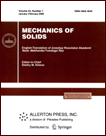 | | Mechanics of Solids
A Journal of Russian Academy of Sciences | | Founded
in January 1966
Issued 6 times a year
Print ISSN 0025-6544
Online ISSN 1934-7936 |
Archive of Issues
| Total articles in the database: | | 13427 |
| In Russian (Èçâ. ÐÀÍ. ÌÒÒ): | | 8178
|
| In English (Mech. Solids): | | 5249 |
|
| << Previous article | Volume 46, Issue 4 / 2011 | Next article >> |
| Yu.N. Radaev, "Continuity Violation Trajectories in Perfectly Plastic Bodies," Mech. Solids. 46 (4), 563-578 (2011) |
| Year |
2011 |
Volume |
46 |
Number |
4 |
Pages |
563-578 |
| DOI |
10.3103/S0025654411040078 |
| Title |
Continuity Violation Trajectories in Perfectly Plastic Bodies |
| Author(s) |
Yu.N. Radaev (Ishlinsky Institute for Problems in Mechanics, Russian Academy of Sciences, pr-t Vernadskogo 101, str. 1, Moscow, 119526 Russia, radayev@ipmnet.ru) |
| Abstract |
The consistency equations for the increments of small strains in a triorthogonal isostatic coordinate system supplemented with additional relations between the physical components of the inconsistency tensor are considered. There are six significant consistency equations. It is proved that, for the stress states corresponding to the edge of the Coulomb-Tresca prism, there are only three independent consistency equations. Systems of independent consistency equations written in the isostatic coordinate mesh are explicitly indicated and studied. Sufficient conditions for the remaining three consistency equations to be satisfied if the three independent consistency equations are satisfied are obtained. It is shown that the continuity violations on the surface of a perfectly plastic body propagate into the depth of the body along asymptotic lines on the layers of a vector field indicating the directions of the maximum principal normal stress. Since the asymptotic lines are less curved than any other lines on the surface (in the sense that the normal curvature of the asymptotic lines is zero), the continuity violations propagate into a perfectly plastic body along the least curved trajectories, which permits one to speak of the minimum curving of crack propagation trajectories in perfectly plastic rigid bodies. |
| Keywords |
yield, perfectly plastic body, continuity, consistency conditions, isostatic coordinates, asymptotic line |
| References |
| 1. | Yu. N. Radaev,
Spatial Problem of Mathematical Theory of Plasticity,
2nd ed.
(Izd-vo Samar. Gos. Univ., Samara, 2006)
[in Russian]. |
| 2. | W. T. Koiter,
"Stress-Strain Relations, Uniqueness, and Variational Theorems for Elastic-Plastic Material
with a Singular Yield Surface,"
Quart. Appl. Math.
11 (3), 350-354 (1953). |
| 3. | Mathematical Encyclopedia, Vol. 3
(Sov. Entsiklopediya, Moscow, 1982)
[in Russian]. |
| 4. | V. I. Blokh,
Theory of Elasticity
(Izd-vo Kharkov. Univ., Kharkov, 1964)
[in Russian]. |
| 5. | L. Malvern,
Introduction to the Mechanics of Continuous Medium
(Prentice-Hall, Englewood Cliffs, N. J., 1969). |
| 6. | L. I. Sedov,
Continuum Mechanics, Vol. 1
(Nauka, Moscow, 1976)
[in Russian]. |
| 7. | K. Washizu,
"A Note on the Conditions of Compatibility,"
J. Math. Phys.
36, 306-312 (1958). |
| 8. | S. Moriguti,
"Fundamental Theory of Dislocations of Elastic Bodies,"
Oyo Sugaku Rikigaku
1, 87-90 (1947). |
| 9. | A. I. Lurie,
Spatial Problems of Elasticity
(Gostekhteoretizdat, Moscow, 1955)
[in Russian]. |
| 10. | G. N. Polozhii,
Equations of Mathematical Physics
(Vyssh. Shkola, Moscow, 1964) [in Russian]. |
| 11. | S. Mizohata,
The Theory of Partial Differential Equations
(Cambridge Univ. Press, Cambridge, 1973; Mir, Moscow, 1977). |
| 12. | R. Courant,
Partial Differential Equations
(Mir, Moscow, 1964)
[in Russian]. |
| 13. | I. G. Petrovskii,
Lectures on the Theory of Partial Differential Equations
(Fizmatgiz, Moscow, 1961)
[in Russian]. |
|
| Received |
04 April 2008 |
| Link to Fulltext |
|
| << Previous article | Volume 46, Issue 4 / 2011 | Next article >> |
|
 If you find a misprint on a webpage, please help us correct it promptly - just highlight and press Ctrl+Enter If you find a misprint on a webpage, please help us correct it promptly - just highlight and press Ctrl+Enter
|
|

 Russian
Russian  English
English